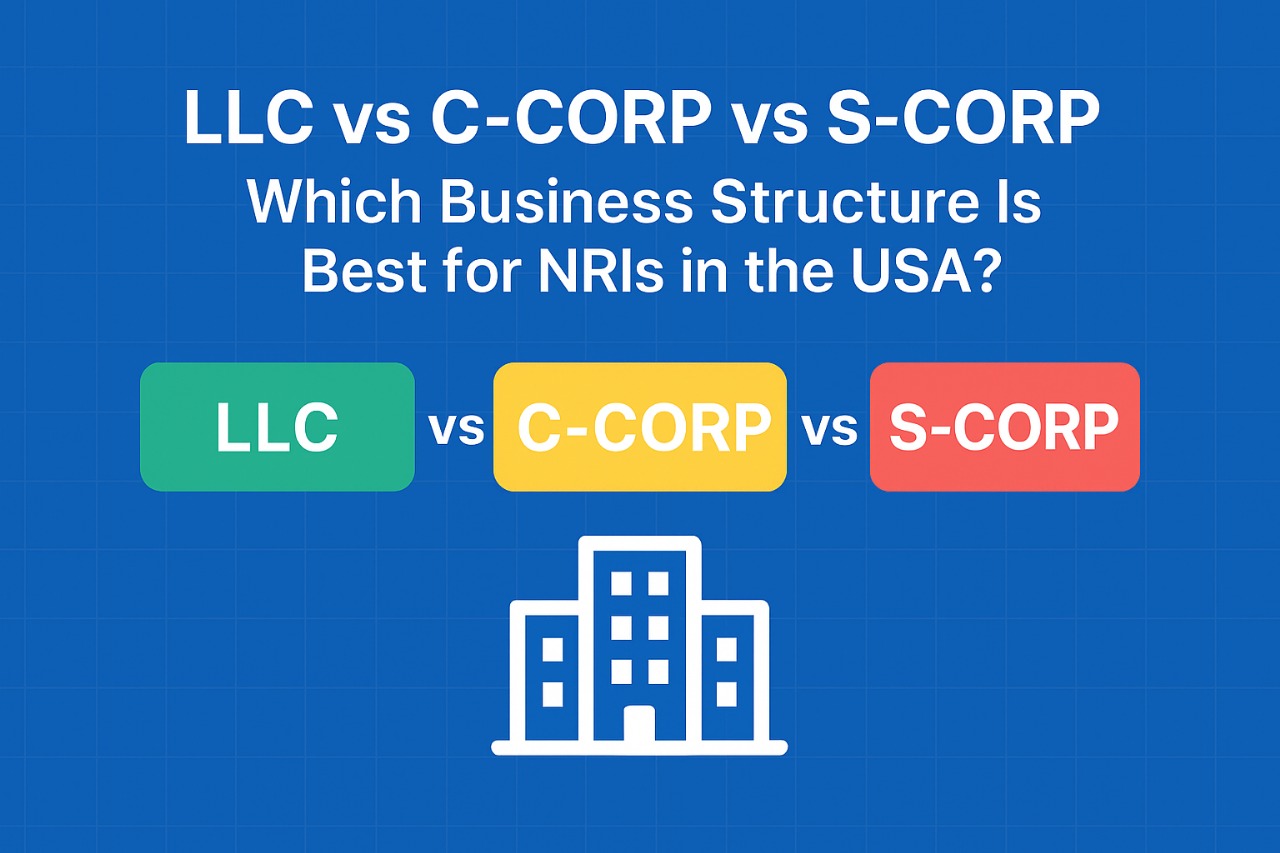 WhatsApp
WhatsApp
 Call Us
Call Us
 Email Us
Email Us
 Whatsapp Community
Whatsapp Community

Launching a business in the United States is an exciting opportunity for many Non-Resident Indians (NRIs). Whether you’re expanding an existing venture or starting fresh, one of your first—and most crucial—decisions is choosing the right business structure.
Your choice between an LLC (Limited Liability Company), C Corporation (C-Corp), or S Corporation (S-Corp) will directly affect your taxation, ownership flexibility, and compliance requirements.
However, since NRIs are classified as non-resident aliens under U.S. law, not all business types are available to them. Understanding what’s allowed—and what’s most beneficial—can save you from costly restructuring later.
Let’s break down the three most common business structures in the U.S. and how each one impacts foreign owners, especially NRIs.
A C-Corp is a standalone legal entity separate from its shareholders. It offers strong liability protection and has no restriction on foreign ownership, making it a preferred choice for international entrepreneurs and NRIs.
Key Advantages:
Taxation:
The company pays 21% federal corporate tax, and dividends distributed to shareholders are taxed again individually—this is known as double taxation.
Despite the dual taxation, C-Corps are often favored by growing businesses due to their structure, investor appeal, and visa eligibility (E-2, L-1, or EB-5).
An S-Corp is designed for small, domestic businesses. It avoids corporate taxation by passing income directly to shareholders’ personal tax returns.
Key Advantages:
Restriction for NRIs:
Only U.S. citizens and permanent residents can be shareholders in an S-Corp.
This means NRIs cannot directly own shares in an S-Corporation.
While certain indirect ownership routes (like Electing Small Business Trusts) exist, they add complexity and are rarely practical for NRI business owners.
The LLC combines the flexibility of a partnership with the protection of a corporation. It’s the most common and NRI-friendly business structure in the U.S.
Key Advantages:
For most small and medium NRI-owned ventures, the LLC provides an ideal balance of tax simplicity, asset protection, and management freedom.
| Feature | LLC | C-Corp | S-Corp |
| Ownership | Unlimited; NRIs allowed | Unlimited; NRIs allowed | Restricted to U.S. citizens/residents |
| Taxation | Pass-through (default) | Double taxation (corporate + dividend) | Pass-through; not available to NRIs |
| Management | Flexible; members or managers | Formal board and officers | Similar to C-Corp |
| Compliance | Simple | High | High |
| Ideal For | Startups, service firms, consultants | Venture-backed or scalable businesses | Domestic small businesses |
When S-Corp is off the table, the choice comes down to LLC vs C-Corp. Here’s how to decide:
Choose LLC if you:
C-Corp: Pays 21% federal tax; dividends taxed again when distributed. Beneficial for reinvestment or global expansion.
LLC: Income “passes through” to members and is taxed once. Single-member LLCs are disregarded entities for tax purposes; multi-member LLCs file partnership returns.
NRIs must also consider foreign income reporting, FATCA, FBAR, and DTAA (Double Taxation Avoidance Agreement) implications when remitting or repatriating profits to India.
LLCs: Must file annual reports and maintain state registration; minimal paperwork.
C-Corps: Require board meetings, bylaws, and corporate tax returns.
Tax Filings for NRIs:
Professional guidance is crucial to avoid penalties and ensure alignment between U.S. and Indian tax obligations.
At Dinesh Aarjav & Associates, we specialize in helping NRIs establish and manage U.S. entities—whether it’s an LLC or a C-Corp—while ensuring complete tax compliance on both sides.
Our end-to-end support includes:
With decades of experience in international taxation and NRI consulting, our team of expert NRI consultants ensures your business remains compliant, efficient, and strategically structured for growth.
For NRIs venturing into the U.S. market:
Your best choice depends on your business model, tax goals, and expansion plans.
Engaging professional advisors who understand both U.S. and Indian tax laws is key to setting up your entity correctly and filing the right forms each year.
Q1. Can an NRI open an LLC in the U.S.?
Yes. NRIs can form and fully own LLCs with no citizenship restriction.
Q2. Why can’t NRIs own S-Corps?
U.S. law allows only citizens and permanent residents to be S-Corp shareholders.
Q3. Which is better for taxation—LLC or C-Corp?
LLCs are simpler with single-layer taxation. C-Corps are better for reinvestment and long-term expansion.
Q4. Do NRIs have to file U.S. taxes for their LLC?
Yes. All foreign-owned LLCs must file annual returns, even with zero income, to remain compliant.
Q5. Can profits from the U.S. business be repatriated to India?
Yes, under proper FEMA and DTAA compliance. We assist in documentation and remittance planning.
Let Dinesh Aarjav & Associates handle your U.S. incorporation, compliance, NRI taxation, and annual tax filings
We ensure every step—from registration to profit repatriation—is compliant with both IRS and Indian tax laws.
Contact us today to begin your journey toward hassle-free U.S. business incorporation and cross-border tax management.







Stay in the loop, subscribe to our newsletter and unlock a world of exclusive updates, insights, and offers delivered straight to your inbox.